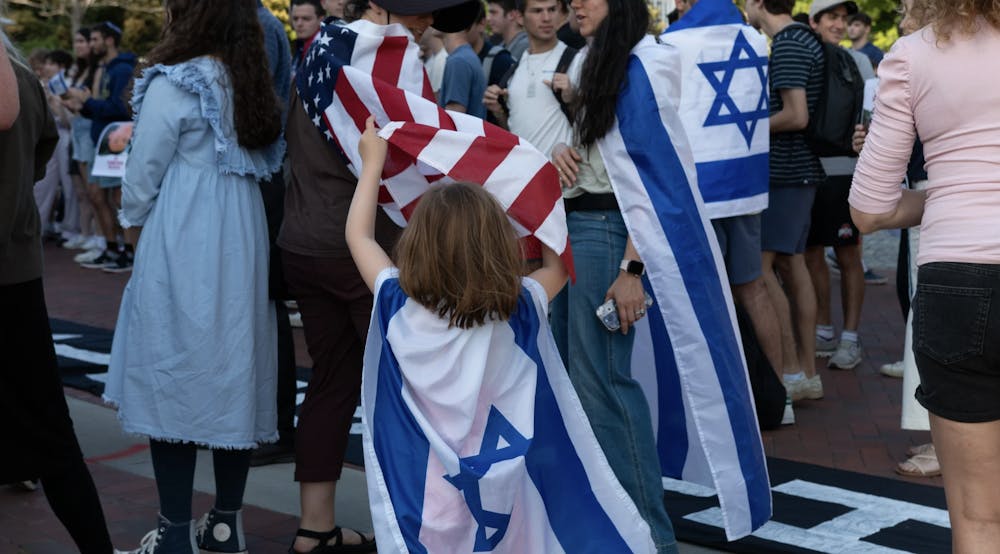I believe in protest. I believe in free speech. I believe in the power of students raising their voices to demand justice, accountability and change. And, I believe something else: Protests and activism on college campuses must never come at the expense of another community’s safety.
Since Oct. 7, 2023, Jewish students, including myself, have found ourselves in an impossible position. We have watched the war in Israel and the Gaza Strip unfold with heartbreak and horror. We have sat in classrooms, walked across the Emory University Quadrangle and scrolled through social media, trying to hold space for mourning and empathy for the hostages still in captivity and the lives lost.
However, on this campus, especially during the protests in April 2024, that space has felt increasingly closed to us. Progressive students have repeatedly told Jewish students at many universities that in order to be accepted as part of our campus community, in this fight for a more equal world, we must disavow Israel. However, 90% of American Jews support the state of Israel, as do each major Jewish organization on this campus. Still, we are told that if we speak up — even if we say we feel unsafe — we are trying to silence others. We are not, we are trying to raise awareness for our safety and the plight of the hostages.
I do not condone the violent suppression of protests. What happened on April 25, 2024 — the arrests, the crackdowns and the images of students in zip ties — was painful to watch. No student should fear punishment for exercising their right to speak out, especially on political issues that matter deeply to them. We must protect that right with urgency and conviction.
But free speech does not mean free rein to traffic in hate.
At that protest, among the chants and signs calling for peace and justice, were words that crossed a line — chants of “there is only one solution, intifada revolution,” signs that erased Israel’s right to exist and rhetoric that reduced Jews to oppressors and Zionism to a slur. We saw posters accusing “Zionists” of genocide plastered around Emory’s campus — as if that word is not tied to the identity and survival of most Jewish students. I heard protesters cheer, taunt and glare when Jewish students like myself walked by. The worst part is that this horrific language used at these protests was not only encouraged but defended by many of our professors in an open letter to University President Greg Fenves.
These students and professors missed something essential – calling out antisemitism and protecting the right to protest are not contradictory. We can and must defend the right to protest and call out times when that protest veers into antisemitism. Both things can be true at once.
This is what’s missing in this moment — the willingness to hold complexity. To understand that Palestinian suffering is real and deserves our compassion, and that Jewish pain is real and Jewish students deserve protection. Justice is not a zero-sum game. Empathy is not a limited resource.
Our university prides itself on being a place of inclusion. We write statements of solidarity with Ukraine. We host teach-ins for pro-Palestinian protesters. The Emory Wheel’s Editorial Board, a group of students claiming to represent the greater campus community, even wrote an editorial in support of Palestinians just a few days after the horrific Oct. 7 attacks. But when it comes to Jewish students, that clarity, that context, too often disappears. Suddenly, our pain is complicated. Our fear is political. Our dignity becomes debatable.
No student should feel like they must hide their identity to feel safe on campus. No one should feel as though their belonging is conditional. That is not inclusion. That is exclusion masquerading as progressivism.
So here is my ask: Be consistent. If we believe in protecting marginalized communities, then that protection must include Jews. If we believe in free speech, then let’s defend it — for everyone. But let’s also be honest when that speech slips into harassment or hate.
Protecting Jewish students does not mean silencing others. Let’s learn from the events of last April and ensure that in the future, students do not target or incite hatred or violence against Jewish students on our campuses. We can do this by grassroots teaching and activism. Let’s encourage debates and dialogue sessions and make sure that the complexities and nuances of the conflict are understood instead of simplifying it to an oppressor versus oppressed narrative as so many on our campus do.
Justice must be for everyone — no exceptions. That includes Jews. That includes Palestinians. That includes every student who calls this campus home.
Contact Noah Stifelman (27C) at noah.stifelman@emory.edu.




![IMG_0064[31].jpeg](https://snworksceo.imgix.net/whl/bd1509fc-0fff-41c3-8a17-14169776d877.sized-1000x1000.jpg?ar=16%3A9&w=500&dpr=2&fit=crop&crop=faces)




